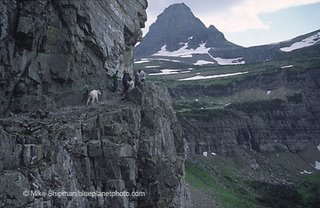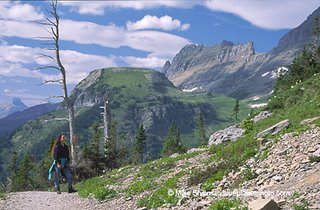Glacier Decline
 Here's a link to a re-photographic survey done in Glacier National Park showing the retreat of many of the glaciers there (down to 29 today from 150 in 1850).
Here's a link to a re-photographic survey done in Glacier National Park showing the retreat of many of the glaciers there (down to 29 today from 150 in 1850). Is this a sign of global warming? Probably. Is the retreat, sometimes dramatic, the result of human-influenced global warming or part of the natural cycle of the Earth warming and cooling?
My opinion on global warming is that there is a natural cycling of warming and cooling, born out by past events scientists have rigorously analyzed through various means, and that what we may be seeing in the present is the upswing of the natural warming trend. Think of the cycle as a series of waves, with a low point (the trough) and a high point (the crest). Animal populations, weather patterns, the stock market, sunspots, emotions, all experience periods of high and low. Some cycles are predictable while others appear more random or erratic. As you may have already read or heard, the steepness of the curve (average temperature increase, for example) of this natural upswing is probably being exacerbated by the inflated amounts of greenhouse gasses put into the atmosphere via industrial processes and the general activities of human beings.
Of course, in the whole time-scheme of things, we've never been in this type of situation before. There are no records of past human civilizations on Earth (or any other planet) or other planetary civilizations with at least our current level of technology to compare data with. This is how we make predictions, by looking at past data from similar situations, comparing that to current data and noting the difference, then hypothesizing a possible result. Since we don't have any direct past experience with global warming events of the predicted magnitude, it's difficult to say with precision what's going on now. There is certainly plenty of evidence suggesting we humans are having a significant impact on temperature increases, weather and climate change and I have no doubt of it. But we still know very little about the Earth's regulatory system and how or to what degree the biosphere of the planet will react to this changing composition. We won't really know until the cycle starts back down (if it's going up), after we've been through it and the environment begins to reflect past historical conditions that we more or less consider "normal".
It's not perfect, and past data can be incomplete relative to analytical methods available today or tomorrow. Also, statistical analysis is not a perfect science. Numbers can be manipulated, data left out or included, that can swing the results one way or another. Peer review helps contain some of that and helps ensure that the conclusions drawn are reasonable. But in general it's mostly a very educated guess. As time goes on and more data is available, more accurate and complex analytical methods are devised, computing power increases, the better these predictions will be.
 So, back to the glaciers. The receding ice is not just about global warming, it's about preservation. Glacier National Park was created and named for the glaciers that lie within its boundaries. What happens when the glaciers disappear completely, or there are only a handful left? Glacier NP becomes Former Glacier NP or Extinct Glacier NP. The scenery is beautiful wherever you look and in typical National Park Visitor fashion, most folks don't stray too far from the road which means fewer people actually see any of the glaciers inhabiting the park.
So, back to the glaciers. The receding ice is not just about global warming, it's about preservation. Glacier National Park was created and named for the glaciers that lie within its boundaries. What happens when the glaciers disappear completely, or there are only a handful left? Glacier NP becomes Former Glacier NP or Extinct Glacier NP. The scenery is beautiful wherever you look and in typical National Park Visitor fashion, most folks don't stray too far from the road which means fewer people actually see any of the glaciers inhabiting the park.The National Park Service (NPS) and National Parks have historically been about preservation, which means keeping a semblence of the original wilderness and conditions that existed when the park was first established. Human perception is also a big player in preservation (which is different than conservation). A primary goal of the NPS is to give visitors a sense of history as well as exposing them to beautiful landscapes. I'm not going to get into a big discussion about the history, good or bad, of the NPS, but policies geared toward preservation don't necessarily work or are workable. Take for example fire supression. Yellowstone. Landscapes and ecosystems change through time. They are not isolated bubbles unaffected by the events of the world surrounding them. Glaciers will come and go, forests will come and go, waterfalls and rivers will come and go.
 People have very short, finite, lives compared to the life cycle of a forest or a glacier. Our view of change is much different than the Earth's view of change (if the Earth had a perception of time). When scenes change from what we are familiar with, especially if there is some emotional attachment, such as a special event or experience tied to a particular location or setting, we tend to think badly if that change is perceived to be an adverse one, like a fire or flood. What if Old Faithful ceased spouting? Most people would think it was a disaster. Geothermal activity is based on hot spots, thin slivers of heat coming from deep in the Earth's crust and mantle. Continental plates move over the top of these hot spots and thus the hot spot seems to move or disappear. It's how the island chain of Hawaii was formed and is still forming. We have no control over the process. Old Faithful does not run the ecosystem of Yellowstone, but the overall geothermal activity underneath has a lot to do with it. If that ceased completely, the character of the park would certainly change, but it would only be different, not wrong or bad.
People have very short, finite, lives compared to the life cycle of a forest or a glacier. Our view of change is much different than the Earth's view of change (if the Earth had a perception of time). When scenes change from what we are familiar with, especially if there is some emotional attachment, such as a special event or experience tied to a particular location or setting, we tend to think badly if that change is perceived to be an adverse one, like a fire or flood. What if Old Faithful ceased spouting? Most people would think it was a disaster. Geothermal activity is based on hot spots, thin slivers of heat coming from deep in the Earth's crust and mantle. Continental plates move over the top of these hot spots and thus the hot spot seems to move or disappear. It's how the island chain of Hawaii was formed and is still forming. We have no control over the process. Old Faithful does not run the ecosystem of Yellowstone, but the overall geothermal activity underneath has a lot to do with it. If that ceased completely, the character of the park would certainly change, but it would only be different, not wrong or bad.So, do we marvel at our ability to maintain a landscape in a "preserved" state like a specimen in a jar, or do we allow the landscape to change and marvel at nature's ability to adapt and survive as it's done since the beginning of time? We can mourn the loss of familiar scenery, but there will be something new in its place. We have to be able to accept the new, embrace it, and be patient that whatever change is coming won't occur overnight and probably not in our lifetime. If that change is based on something humans have done or are doing, can it be stopped? Should it be stopped?
I believe we can learn from the past, but the cycle of human existence is still being written and we know less of that than we do about the origin of the universe. How significant is a glacier in all of that?




0 Comments:
Post a Comment
<< Home